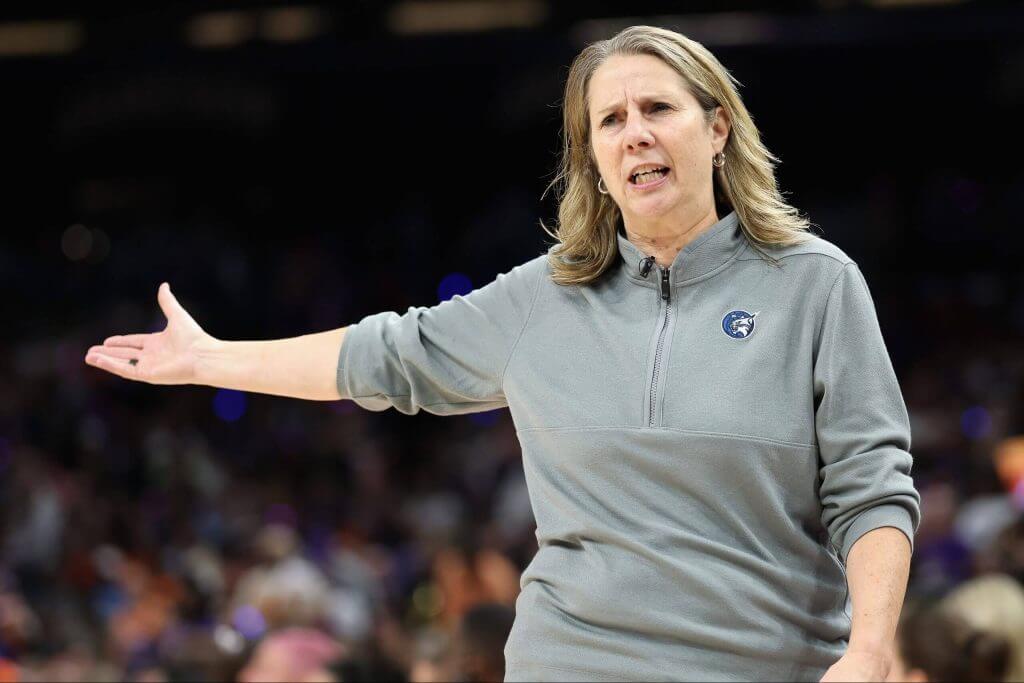Minnesota coach Cheryl Reeve left the WNBA with no choice Saturday afternoon when the league announced she would be suspended for Sunday’s Game 4 against the Phoenix Mercury.
Yes, the stakes are high. Reeve’s top-seeded Lynx are down 2-1 in a best-of-five series, fighting to keep their season alive in a difficult road environment. But if Reeve, the league’s longest-tenured coach, were not punished for Sunday’s game, then what would ever constitute a coach’s suspension?
Advertisement
The WNBA rattled off a litany of reasons for Reeve’s disciplinary action.
It wasn’t just that she stormed after one of the game’s three officials with 21.8 seconds remaining, furious at a no-call on Mercury star Alyssa Thomas. It wasn’t just that she appeared to direct profanity at fans when exiting the court after her ejection. And it wasn’t just that Reeve lambasted officials on the podium to reporters after Minnesota’s 84-76 loss, in two minutes of commentary that was as animated as any coach’s postgame remarks in recent memory.
It was that all three things occurred.
Even though the league made the right decision in suspending Reeve, many of her points were valid. Several coaches and executives around the league agreed with Reeve’s frustration, both before and after Friday’s incident, denouncing WNBA officiating as too inconsistent and sub-standard.
Not punishing Reeve would seemingly create a precedent the WNBA doesn’t want. It would have created Reeve Rules; that she (or any highly regarded coach) can say or do whatever they wanted in regard to officiating and not receive meaningful discipline. A one-game suspension to open next season? That would have been the equivalent of a slap on the wrist. A mere fine? A mere paper cut.
Advertisement
The league couldn’t ignore what happened on Friday night, and let her widely-seen diatribe and animated exit go without consequence.
For years, league coaches and executives, both publicly and privately, have displeased with how WNBA freedom of movement rules are enforced (or rather, not enforced). The WNBA rule book has subsections regarding “Contact Situations,” going into detail about incidental contact, screening, dribbling and guarding an opponent.
“The restrictions placed upon the player by the rules are intended to create a balance of
play, equal opportunity for the defense and the offense, provide reasonable safety and
protection for all players and emphasize cleverness and skill without unduly limiting
freedom of action of players or teams,” the rule book states.
As evidenced by Reeve’s remarks on Friday, she strongly disagrees that players are being protected. Any cleverness, she surely would argue, is diminished by opponent force. Skill is limited by physicality.
Advertisement
“When you let the physicality happen, people get hurt, there’s fights, and this is the look that our league wants for some reason,” Reeve said. “We were trying to play through it. We try not to make excuses… And so if this is what our league wants, then OK, but I want to call for a change in leadership at the league-level when it comes to officiating. It’s bad for the game.”
Las Vegas Aces coach Becky Hammon voiced a similar complaint — in a rare moment of unity between a white-tailed deer and elk. Hammon complained about the physicality before playing the Fever and again after a semifinals win against them.
“You can bump and grab a wide receiver in the NFL for those first five yards, but you can do it in the W for the whole half court,” Hammon said. “You put two hands on somebody — that should be an automatic foul.”
Advertisement
And when Fever coach Stephanie White was asked about physicality before Game 3 of her semifinals, she quipped, “Are you trying to take my money?”
Reeve’s pocket has now been affected. She was fined, in conjunction with her suspension. But if all the WNBA did was thin Reeve’s wallet then unsatisfied coaches likely would have felt like they had more free reign going forward.
Even those who feel a similar disdain toward WNBA officiating should realize that Reeve’s conduct forced the WNBA’s hand.
This article originally appeared in The Athletic.
Minnesota Lynx, WNBA, Opinion
2025 The Athletic Media Company
